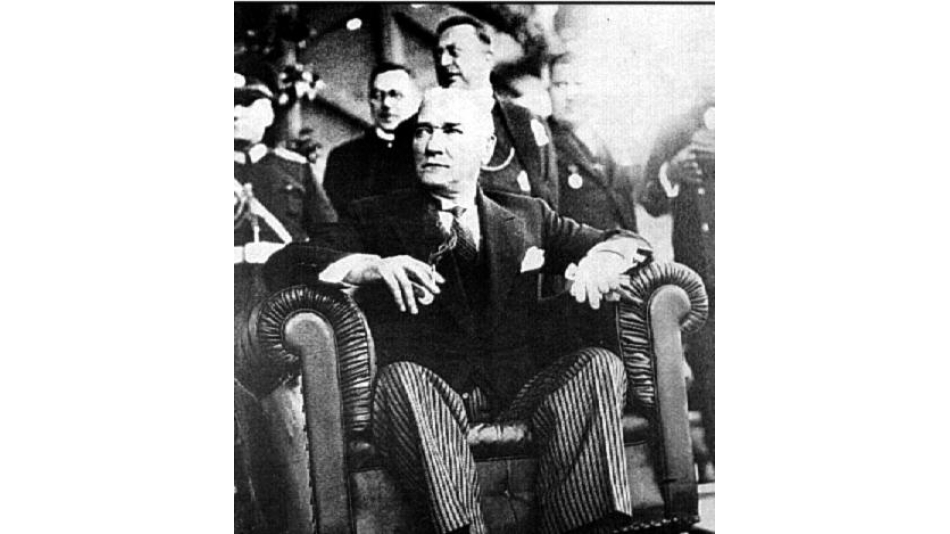KURUMSAL
SON DUYURULAR

2024 Yılı Olağan Genel Kurul
29 Ekim 2024
Derneğimiz Işıklar Askeri Lisesi Mezunları Mezuniyetlerinin 40'ıncı yılında Işıklar Askeri Lisesi'ni Ziyaret Ettiler
29 Ekim 2023
Derneğimiz Kuleli Askeri Lisesi Mezunları Mezuniyetlerinin 40\'ıncı yılında Kuleli Askeri Lisesi\'ni Dışarıdan Ziyaret Ettiler
21 Ekim 2023
Derneğimizin Kuruluşunun Dokuzuncu Yıldönümünde Anıtkabir\'e giderek Ulu Önderimizi Ziyaret Ettik
26 Ağustos 2023
2022-2023 Öğretim Yılı Burs Faaliyeti Sonuçları
21 Temmuz 2023
The National War of Independence (1919-1923).
The National War of Independence was an effort to create a new state from the ruins of an Empire
which had completed its life. These efforts lasted for four years because the imperialist states
wanted to bring to life a new order suitable for their own political aims and interests from the
ruins of this empire.
The Turkish resistance movements were transformed into a complete war of
independence when Mustafa Kemal landed at Samsun as the Inspector of the 9th Army on 19 May
1919. It achieved success against the armies supported by the large countries of the
world and under very difficult conditions.
Mustafa Kemal, who joined the Ottoman Army as a captain on 11 January 1905, proved his military
talents on almost every front during the First World War. When the Ottoman Empire was considered to
be defeated following the First World War, he was appointed Commander of the Lightning Armies.
However, when this army was abolished, he returned to İstanbul. Mustafa Kemal, who understood
that a political result could not be reached against the occupying powers which were
oppressing the İstanbul Government, decided to go to Anatolia and carry on his
struggle from there. He immediately started to organize national resistance and got in touch
with all the army units and resistance organizations in Anatolia. He made the first call
for a national movement with the circular he issued in Amasya on 22 June 1919. He organized this
national struggle with the Erzurum and Sivas Congresses, giving it an official status.
According to the National Pact program which took its final shape at the Sivas
Congress, the territories where the Turks lived could not be partitioned in any form and
limitations such as capitulations which would prevent the political, legal and financial
development of the country would definitely not be accepted.
When the Entente Powers officially occupied İstanbul and disbanded the Parliament on 16 March,
Mustafa Kemal declared that the sovereignty and life of the Ottoman Empire, which had lasted for
six centuries, was ended.
He announced that the Grand National Assembly would gather in Ankara, the
headquarters of the national movement, on 23 April 1920 and the authority to represent the nation
would only belong to this parliament as of this date. In fact, the Turkish Grand National Assembly
(TGNA), which undertook the duties of saving and administrating the country and obtaining complete
independence for the country, started activities on 23 April 1920 with extraordinary authority.
Mustafa Kemal was elected as the President.
The last connections between Ankara and İstanbul ended with the signing of the Treaty of Sevrès on
12 August 1920. The agreement included very oppressive conditions for the Turks. According to the
agreement, the Turks could be sovereign on only a small part of Anatolia and their state would be
under the financial and military control of the foreign states.
The efforts to set up an Armenian state in Eastern Anatolia, by using the Treaty of
Sevrès were made ineffective by the forces of the Army Commander Kazım Karabekir in this region.
After the armistice was signed on 18 November 1920, peace was obtained on the Eastern
front by the Gümrü Agreement which was signed on 2 December 1920. This was the first
international agreement which was signed by the
TGNA.
On the Western front, the Greek Army which occupied İzmir on 15 May 1919 and started
to spread throughout the Aegean region, was stopped by the First and Second İnönü Battles between
January-April 1921. The Greek Army suffered a heavy defeat during the Sakarya Battles
between August-September 1921. The Sakarya Battle victory provided significant diplomatic
successes and France withdrew from Adana and the surroundings with the Ankara Agreement signed by
Turkey and France in October 1921. Thus, another front was eliminated. After that, all the forces
and resources of the country were gathered for a great attack to be made on the Western front. In
fact, the Greek forces were defeated heavily during the Great Attack and Commander in Chief Battle
between August-September 1922. İzmir was liberated on 9 September 1922. This military success would
accelerate the founding of the Republic of Turkey. The Mudanya Armistice was signed between the
Ankara Government and the Entente States on 11 October 1922 and it was decided to hold a conference
in Lausanne one month later to discuss the conditions for a permanent peace treaty. However, when
the Entente States also invited the İstanbul Government to send its delegation to this conference
along with the Ankara Government, the TGNA declared that the Caliphate was separated from the
Sultanate and that the sultanate was abolished. Mehmed IV (Vahideddin), the last Ottoman
Sultan, secretly fled aboard a British ship on 17 November 1922.
The Lausanne peace treaty negotiations, at which the Ankara Government participated as the sole
representative, started on 21 November 1922. The negotiations, at which İsmet İnönü presided
over the Turkish delegation, were suspended in February 1923 due to disagreements especially
on the future of capitulations. The negotiations, which restarted in April 1923, resulted in the
signing of the Lausanne Treaty on 24 July 1923. The treaty recognized the creation of a Turkish
State with virtually the same borders as those of the National Pact of 1920 and guaranteed her
complete independence. Thus, it marked the successful culmination of the National War of
Independence.
A few months following the signing of the Lausanne Treaty, in which the Allied powers and the world
recognized the independence and sovereignty of Turkey, the Republican People's Party was
established on 9 September 1923 and Mustafa Kemal was elected as its chairman. The administrative
staff of the party was composed of the military staff who directed the national struggle and
high-level bureaucrats. The party led by the leader and the hero of the Turkish War
of Independence stood for modernizing and westernizing reforms in the political, judicial and
educational fields.
The struggle for independence the Turks waged against the imperialist states and the radical
social, political and economic reforms initiated by Atatürk, constituted an
important example and model for the Third World countries.

